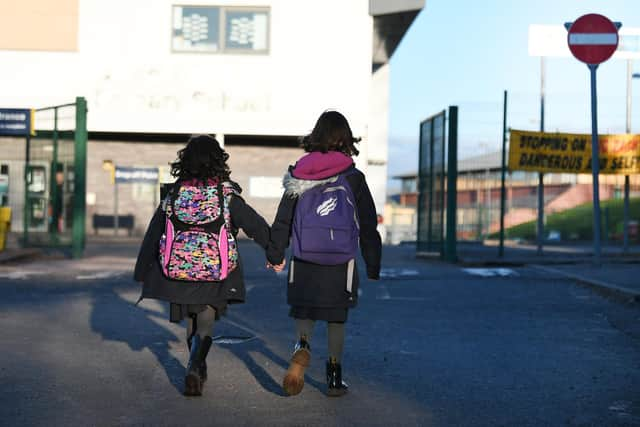Glasgow headteacher warning over mental health among pupils
and live on Freeview channel 276
Springburn Academy boss Linda Hamilton raised the concern as the school revealed groundbreaking work taking place to help children cope with anxiety, low mood and other issues.
Mental health sessions have been taking place for P7s heading to the academy and secondary pupils get well-being lessons based on cognitive behavioural therapy.
Advertisement
Hide AdAdvertisement
Hide AdMrs Hamilton said within the “Springburn learning community” that spans Possilpark, parts of Maryhill and elsewhere “the biggest single factor we are struggling with is the mental health of the young people and their families in dealing with everything and that is prior to the pandemic. It has just got bigger and bigger through the pandemic.”


Mrs Hamilton praised mental health projects running in the secondary and its feeder primaries delivered by the the Scottish Association for Mental Health (SAMH). More than 450 children have benefited.
Speaking at the Springburn and Robroyston Area Partnership meeting yesterday, she said: “This has made a massive impact.”
Sessions at Springburn Academy called ‘Time for Me’ helped pupils with anxiety, low moods and anger issues. After it seventy one per cent of youngsters said it increased their confidence and helped them deal better with life’s challenges.
Advertisement
Hide AdAdvertisement
Hide AdOne child said: “I am getting better at noticing when I’m anxious and I feel more confident in asking for help.”
Other work saw 199 P7 children get 42 sessions to help them manage the move to secondary and deal with stress.
Explaining the transition work, Joanne Aitken children and young people development manager at SAMH, said: “That was all around helping young people understand mental health and helping them understand and manage stress. They were experiencing a lot of stress and anxiety about Covid, about going to high school and living in really difficult home environments.”
Other practices saw children getting involved as mental health ambassadors and webinars were delivered giving advice on how to have a mental health conversation.
Advertisement
Hide AdAdvertisement
Hide AdMs Aitken said people are scared to ask about issues for fear of making a situation worse.
She said: “ You are not gong to make it worse by asking somebody how they are doing and really listening to them and showing you are there for them.”
Summing up the mental health programmes, she told the meeting: “Ultimately what we are trying to do is create a mentally healthy learning community where mental health is normalised. It is accepted, it is understood and we we have a culture of open positive conversations about mental health. If we understand it better we are better able to seek help.”
The SAMH work – which involved a connect co-ordinator worker – was funded with £200,000 from Morgan Stanley. The council also contributed £10,000.
The team need another £25,000 to continue the project until June 2023.
Comment Guidelines
National World encourages reader discussion on our stories. User feedback, insights and back-and-forth exchanges add a rich layer of context to reporting. Please review our Community Guidelines before commenting.